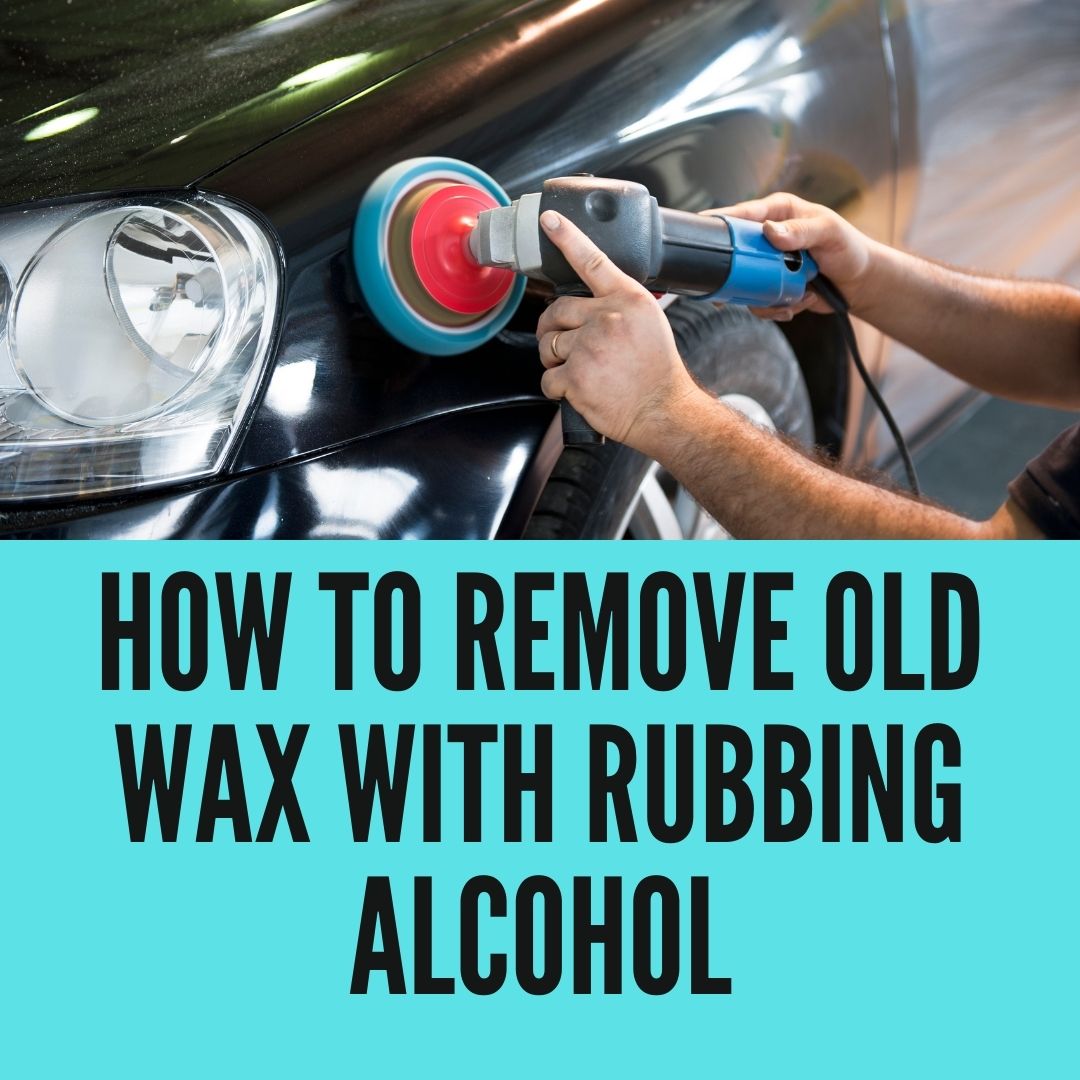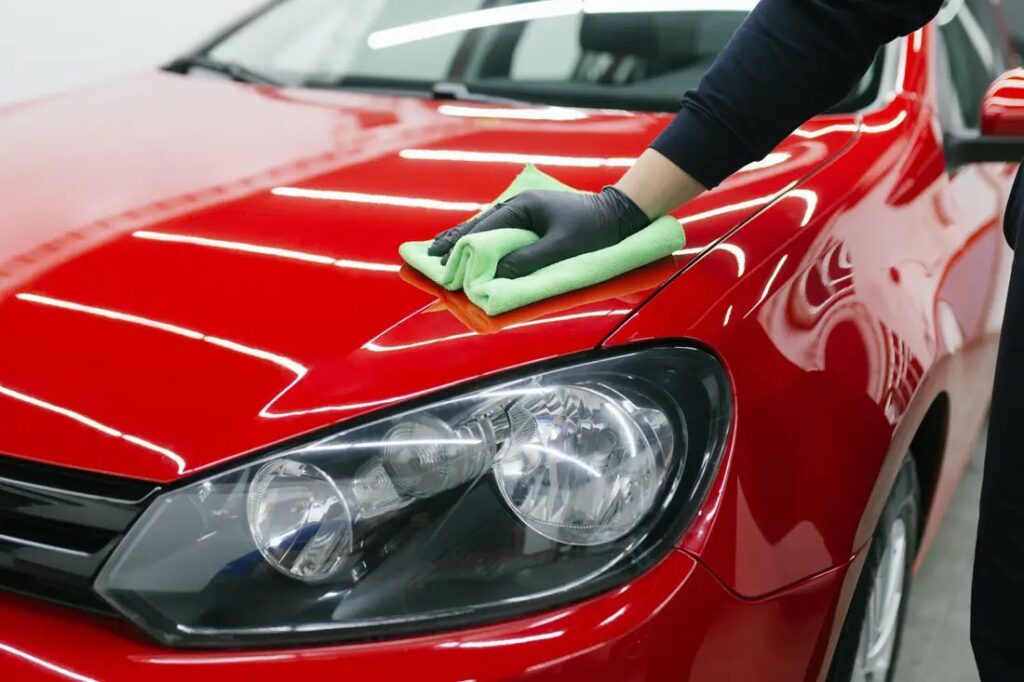
Ever notice how vehicle paint fades over time? If you look closely at your hood and body panels, you’ll probably realize thousands of micro-scratches and little swirls in the paint.
These are tiny scratches in the clear coat and paint caused by sand on the road, going through commercial car washes (non-laser), and everyday wear and tear.
The only way to prevent these is to put a protective transparent film over the surface of your car. However, most dealerships never tell you about this, and it can be quite expensive to wrap your entire car in this. That leaves you with one option- polish them out!
Before you start going crazy with the polisher, though, you need to remove the old car wax. While there is a wide range of products on the market that can do this, most professionals swear by rubbing alcohol! This cheap, easy-to-find solvent is perfect for removing wax, grease, grimy build-up, and preparing the paint surface for polishing and/or repainting.

Although the process itself is quite easy, there are several important steps in the process as well as a few safety precautions that you need to know about, so you don’t miss your paint up and damage your car. Keep on scrolling to find out everything that you need to know!
Removing Car Wax With Rubbing Alcohol
If you’ve ever surfed through YouTube looking at car detailing videos, then you’re probably used to seeing a bunch of fancy new-age car products. Sprays, waxes, solvents, etc. They tend to be expensive, hard-to-find, and probably give you the wrong impression of car detailing.
Here’s the thing, though- most of these “influencers” showcasing their fancy products are just paid, advertisers. The companies who manufacture these expensive products send the YouTube creators a bunch of free products (sometimes even cash money) to talk about how awesome they are and how these products are “must-haves.”
Admittedly, some of these products are actually pretty cool. I’ve even bought a few for myself. However, I call bullshit on about 80% of the products out there. If you take their word for it, then you’ll need to spend close to $100 for a few bottles of fancy “wax remover.”
I’m here to tell you differently.
Regular old-fashioned rubbing alcohol is incredibly cheap (try $2 a bottle), can be found at your local grocery store, and is perfect for removing car wax! All you need to do is spray a diluted mixture on the car’s body panels, let it sit for a minute, and then wipe it off. Within minutes, you’ll be ready to start polishing or sanding.
As a side note, you can also use rubbing alcohol to clean glass on your car while you’re at it! It does a great job of removing all of the smudges, smashed bugs, and other nasty stuff. Understanding why removing car wax with rubbing alcohol is so effective helps to understand how the process works.
Car wax is basically a transparent, super-thick oil layer that binds to the surface of your vehicle. It protects the paint from the elements and helps the waterfall off to not pool up and cause rust.
The key point to remember is that it’s oil-based. If you remember back in your high school chemistry class, oils are mostly made up of non-polar molecules. To dissolve non-polar molecules, you’ll need to use a solution that also contains non-polar molecules, and rubbing alcohol is perfect!
After soaking for a couple of minutes, the alcohol is able to completely break the bond between the wax and your paint’s surface. After spraying your car down, you just need to hose your car down to remove all of the old wax, dry it off, and you’re ready to begin polishing!
Here are some other posts that might interest you:
- 7 Uses of Rubbing Alcohol in Car Detailing
- Can Rubbing Alcohol Be Used On Car Paint?
- Isopropyl Alcohol Alternatives For Disinfecting
Safety Precautions When Using Rubbing Alcohol On Car Paint
That being said, you need to follow ONE rule when it comes to using rubbing alcohol on your car:
NEVER, EVER use full-strength rubbing alcohol on your car’s paint. As we mentioned, alcohol is a very powerful solvent.
In small concentrations, it’s perfect for removing old wax, grease, and grime. In stronger concentrations, though, it can dissolve your paint and expose the bare metal beneath.
Unless you’re trying to repaint your entire car, this is not what you want. I recommend diluting your rubbing alcohol mixture to around 10% just to be safe. A little bit goes a long way.
Now, you may have to do a little bit of math here. The rubbing alcohol that you purchase at the store is already diluted with water, but nowhere near as diluted as you need it to be.
For example, if you purchase 90% isopropyl rubbing alcohol, that means it’s 10% water and 90% alcohol. To dilute it down to 10% alcohol, we need to add 8 parts of water to the mixture.
The simplest way to achieve this is to put 10 ounces of the 90% alcohol in a spray bottle and then add 8 ounces of water to the mixture.
The total volume should be 18 ounces or just over 2 cups. You’ll probably need more than this to coat your entire car, so it’s a good idea to go ahead and fill a couple of spray bottles ahead of time.
What If I Spill Too Much Alcohol On My Car?
Even the best of us make mistakes sometimes. Once, I saw somebody put an almost-full bottle of rubbing alcohol on top of the car without the lid screwed on tightly.
Then, they forgot about it, knocked it over, and it spilled all over their hood. Naturally, they panicked before I stepped in and offered a helping hand.
If you happen to make the same mistake, the best solution is to immediately dilute it. Either hose the section down or dump a couple of bottles of water on it (whichever is closer). Keep in mind that time is of the essence! If you let it sit for more than a few seconds, it can quickly damage your paint.
What’s The Best Alcohol For Removing Car Wax?
There are several kinds of rubbing alcohol, but we recommend using your standard isopropyl alcohol. This is the easiest to find, the safest for use on car paint, won’t produce dangerous fumes, and won’t irritate your skin while you spray it.

My name is Logan, and I’m a 36-year-old dad who owns a small pressure-washing company in the suburbs of Atlanta, Georgia. My main goal with rubbing-alcohol.com is to show you how versatile isopropyl rubbing alcohol can be! I hope. You find it useful.
